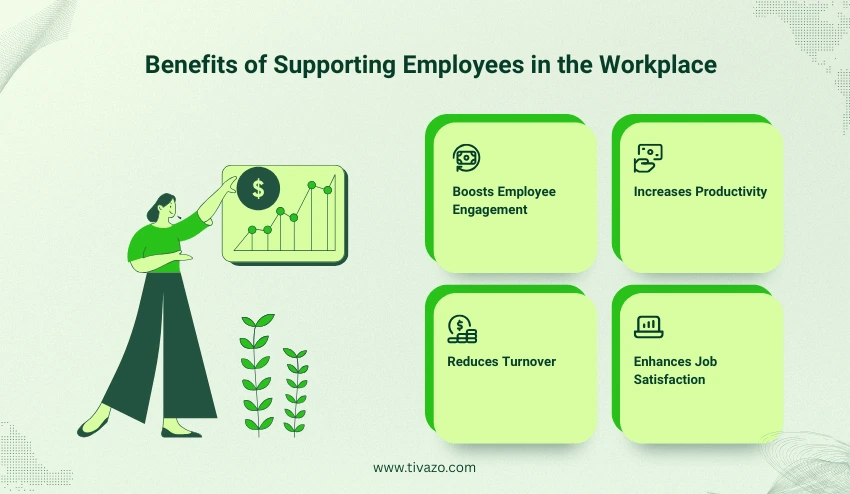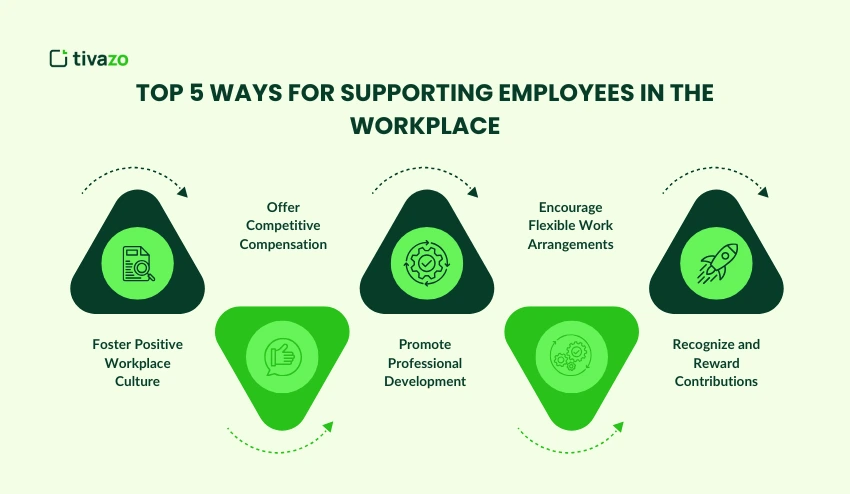Organizations today in the competitive business environment are coming to realize that the most valuable asset they possess is not technology or even products, but rather their people. Supporting employees is not a nice thing to do at the workplace; it is a calculated step towards performance, retention, and growth in the long run.
When the employees are valued, supported, and empowered, they work better, longer, and become more meaningful to the organizational objectives. Research indicates that businesses that invest in supporting employees experience greater engagement, greater productivity, and overall success. The benefits of mental health initiatives to work flexibility, the means of aiding employees are changing, and the reward is indisputable.
Helping employees at the workplace will develop a climate in which people work well, cooperation is enhanced, and innovation will come naturally. Either in terms of recognition, professional development, or positive culture, an organization that provides employee support will find a measurable outcome. This article will examine ways to make organizations stronger in terms of the workforce and enhance overall success, and make employees feel like they are truly valued and motivated.
What Do You Mean by Supporting Employees?
Supporting employees can be defined as the strategies, practices, and resources that organizations offer to their employees in order to ensure that they flourish both at work and in their personal lives. It is more than mere management- it is an investment in employee well-being, a positive workplace culture, and growth and development opportunities.
Companies that are concerned with taking care of their workers at the workplace will emphasize areas such as proper communication, good remuneration, work-life balance, and professional growth opportunities. This encouragement increases the level of employee engagement, motivation, and satisfaction, which stimulates increased productivity and decreased turnover. SHRM further states that employee retention is up to 31% higher in organizations that support their employees well at the workplace.
Finally, supporting employees involves fostering the environment in which people feel appreciated, empowered, and have the ability to succeed, which is beneficial both to the employees and the organization in general.
Why Supporting Employees in the Workplace is Important?
It is necessary to support employees in the workplace to promote engagement, motivation, and general productivity. The more employees feel respected and appreciated, the more they tend to bring forth innovative ideas, work in teams, and remain highly performance-driven. The resources, mentorship, and favorable working conditions given to the employees not only assist in accomplishing the objectives of the employees but also promote a culture of trust and accountability in the organization.
Moreover, supporting employees minimizes employee turnover, enhances job satisfaction, and builds organizational loyalty. Gallup claims that supported employees are 41% percent less likely to burn out and 21% percent more productive. With investment in mental health resources, employee development, and recognition programs, businesses will not only fuel long-term success but also guarantee that the workforce will be motivated and committed.
In short:
- Supporting employees boosts engagement and motivation.
- It enhances productivity and innovation.
- Reduces turnover and strengthens loyalty.
- Increases job satisfaction and workplace morale.
- Contributes to long-term organizational success.
Benefits of Supporting Employees in the Workplace
Supporting employees at the workplace will make them feel good and improve performance and satisfaction. Companies that value their employees and their growth have long-term success.

1. Boosts Employee Engagement
Supporting employees will promote engagement, motivation, and commitment to the organizational objectives. The productive, innovative, and committed employees are engaged, and this improves the overall business performance.
2. Increases Productivity
When organizations pay attention to employees, individuals possess the tools, resources, and directions to perform their jobs well. This minimizes mistakes, speeds up the work process, and increases efficiency.
3. Reduces Turnover
Workers who feel that they have been appreciated and helped are more likely to remain in an organization over the long term. Supporting employees in the workplace fosters loyalty, reduces the costs of recruitment, and retains institutional knowledge.
4. Enhances Job Satisfaction
Supporting employees creates a favorable workplace culture in which employees feel valued. The degree of job satisfaction enhances cooperation, morale, and harmony at the workplace.
Prioritizing supporting employees in the workplace is a strategic move that strengthens engagement, productivity, retention, and satisfaction. Organizations that commit to these practices create a motivated workforce that drives sustainable success.
7 Best Ways For Supporting Employees In The Workplace
Increasing engagement, productivity, and overall organizational success requires supporting employees in the workplace. With the help of effective measures, businesses can develop a flourishing atmosphere in which workers feel appreciated and inspired.

1. Foster Positive Workplace Culture
One of the best methods of supporting employees is by creating a positive workplace culture. Respect and inclusion will encourage employees to cooperate, share ideas, and work towards achieving company objectives.
Supportive culture promotes openness, trust, and free communication. The morale and turnover are reduced in such teams, and this has a direct influence on organizational performance.
Companies can promote such a culture by rewarding success, marking milestones, and building team spirit. Firms maintain loyalty and long-term commitments when they always take care of employees in the workplace.
2. Offer Competitive Compensation
An essential part of supporting employees is fair and competitive remuneration. When workers feel they are being adequately compensated in line with the efforts they are putting in, they are more motivated and into their work.
In addition to the base salary, the provision of benefits like health insurance, retirement plans, and bonuses enhances the perception that the organization values its workforce. Such benefits are essential to the satisfaction and retention of employees.
Periodic review of the compensation packages will make the company competitive in the market. A well-paid staff will enhance loyalty and stability in the workplace.
3. Promote Professional Development
Professional development is one of the strategies to invest in employees. Training, mentorship, and skills development opportunities can help employees develop in their careers and become more useful.
Companies with a high focus on professional development tend to have higher engagement and performance. When employees can access learning opportunities and clear future career development opportunities, they feel valued.
Through the establishment of structured development programs, businesses show that they are interested in the long-term success of their employees. Innovation is also triggered by continuous learning opportunities, as well as the retention rates.
4. Encourage Flexible Work Arrangements
In contemporary working environments, flexible work arrangements are becoming more significant in supporting employees. Flexible schedules or remote work can help employees and increase the overall productivity of the company.
As per the research, flexible work policies improve work-life balance and reduce burnout rates. When employees get the feeling that they are trusted to manage their time, they become more motivated and loyal to the organization.
Flexible hours, remote working, or compressed workweeks are some of the ways that companies can adapt to accommodate the various needs of employees. Helping employees in such a manner demonstrates empathy and respect for their personal and professional lives.
5. Recognize and Reward Contributions
Recognition is a powerful tool for supporting employees. Rewarding accomplishments (verbal praise, awards, and incentives) on a regular basis will help increase morale and reinforce the good behavior.
Recognition programs make employees feel like they have achieved something, and they are encouraged to continue to perform. When employees feel valued, they are more engaged, more productive, and will tend to stay with the organization.
Making recognition practices institutionalized, companies guarantee that the supporting employees will become a regular component of the working culture. Successes should be celebrated as this enhances relationships and leads to long-term growth of the organization.
6. Prioritize Employee Well-Being
Supporting employees implies taking care of their health and state of mind. For employees who work alone or in isolated environments, a lone worker device strengthens well-being by providing emergency alerts, real-time location sharing, and rapid response if an incident occurs. The availability of facilities such as wellness programs, counseling services, and stress reduction programs keeps the employees healthy and focused.
Well-being creates productivity and minimizes absenteeism. WHO states that up to 30% percent of stress can be decreased among employees through workplace mental health programs.
Well-being can also be promoted by employers who should encourage breaks, healthy work habits, and a supportive work environment. One direct method of supporting employees at the workplace and enhancing overall performance is to invest in employee wellness.
7. Maintain Open Communication
Effective communication between the management and the employees is crucial, and it should be transparent and open. Employees should feel that they are listened to and understood, and be aware of organizational changes and goals.
Frequent meetings, surveys, and feedback build confidence and make employees feel empowered to express concerns or ideas. Communication results in loyal and engaged employees when the employees feel nurtured.
Organisations that value open communication show a certain level of dedication to upholding employees in the workplace. Communication makes things clear and prevents confusion, as well as enhances team building.
Supporting employees at the workplace is a continuous process that spurs engagement, loyalty, and organizational development. These seven strategies will help companies build an environment where employees will be valued, motivated, and empowered to succeed.
What support do you need from the organization?
Supporting employees in the workplace must be holistic to support both personal and professional needs. Employees require assistance in fields like career growth, learning material access, mental health, work-life balance, and a safe, inclusive environment.
Professionally, it helps the employees in terms of organized career development, training, and mentorship. Giving out tools, technology, and directions makes the employees work efficiently and fulfill their potential. By investing in employee development, the organizations demonstrate their desire to ensure the long-term success of their employees.
Personally, mental health support, flex work, and wellness programs are essential. Gallup states that when employees feel that they are supported in the workplace, they will be 21% percent more productive and 41% percent less likely to burnout. Through listening to the needs of employees and providing them with resources, the companies develop a culture of trust and engagement, which eventually makes the overall organizational performance more effective.
What support do you need from your manager to accomplish your goals?
Supporting employees in the workplace starts at the managerial level, where guidance and mentorship play a crucial role in helping individuals achieve their goals. Employees require managers who are clear about their expectations, offer constructive feedback, and give them the resources to succeed.
Good managers will be providing frequent coaching and check-ins to monitor progress and manage challenges. Managers can help to motivate employees by offering constructive feedback and acknowledging milestones so that the organization will demonstrate its willingness to invest in the professional development of employees. According to Forbes, workers who get regular direction and support from their managers are more involved and 2.5 times more likely to surpass performance expectations.
Also, managers can instill power into employees by promoting autonomy, providing assistance in solving problems, and eliminating performance barriers. With the combination of mentorship, resources, and open communication, managers not only enable employees to achieve their goals but also improve workplace engagement and long-term success.
Supporting Employees in the Workplace Using Tivazo
Tivazo offers managers and team leads powerful tools to automate communication, monitor performance, and better employee engagement. With Tivazo, managers are able to track progress, delegate duties effectively, and give employees the guidance and support that they require. This degree of supervision assists in employee assistance at the workplace as it can detect the challenges early and allocate resources timely manner to overcome them.

Conclusion
Moreover, Tivazo provides qualities that encourage teamwork and career development. Managers are able to design personalized workflows, exchange feedback, and reward performance, which drives employees and enhances retention. Incorporating Tivazo into everyday practices, organizations will be able to promote a culture of accountability, transparency, and continuous development, which will enable organizations to support employees in the workplace and make it more measurable.




